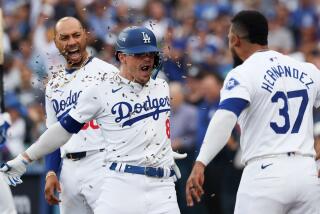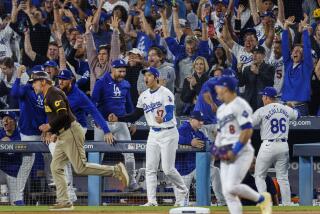For the Dodgers, It’s Not Easy Being This Mediocre
The Dodgers weren’t very good again.
Sometimes they win in spite of themselves, in spite of the roster Jim Tracy is left with, the batting order he shakes out of it, and the defense he culls from hunches and pre-game introductions and process of elimination.
That might work in the National League West, and then only once in a while. But, as we’ve learned over the last few weeks, a lineup without Milton Bradley, and now without J.D. Drew, means a lot of outs around Jeff Kent. And a defense of fringe big leaguers and out-of-position fill-ins has a tendency to botch plays difficult and routine.
And none of it is sitting particularly well with a pitching staff that had its own issues early, only to turn itself around and find it’s all alone out there.
This is no place to be on the verge of July, when the New York Yankees and Chicago Cubs are reported to be fighting over Oakland A’s outfielder Steve Kotsay, and when outfielders could be had from New York (Mike Cameron), Florida (Juan Encarnacion) and beyond.
Only Paul DePodesta knows for sure what’s out there, but there’s no mystery to what is here: a large-market baseball team circling the drain in the weakest division in the game, nine losses in 11 days, chins hitting chests all over the clubhouse, and no sign of reinforcements anywhere.
The details on a Friday night in Anaheim, where the Dodgers were 7-0 losers to the Angels, were familiar. A few balls fell that shouldn’t have. A pitcher lost when he should have had a chance to win. Kent had two hits and died on the basepaths.
And a good team, one built with depth and parts that fit, ran them out of town. Their own town, as it turned out.
The hard truth is, every healthy and active Dodger could play to his capability and the team would still lose half the time. But, then, that could be the optimistic view. No one seems to know when Bradley or Drew will return, or Jose Valentin or Ricky Ledee for that matter, and Tracy is left to break in handfuls of wide-eyed players every night.
For that reason, the Angels hit a couple of balls hard, scored seven runs and caught everything, and the Dodgers reached third base once, didn’t score, and pitched a calliope over the whole thing.
In a mopey clubhouse, nobody blamed the children among them. This is not their fault. If they were older, if they were better, they’d have been here in April. If the organization was not setting land-speed records to the disabled list, the rookies and near-rookies be here next April. Or the one after that.
Olmedo Saenz, one of the few big-league hitters left in the lineup, sat afterward with his elbows on his knees. Around him, unfamiliar teammates gathered their things, double-checked Saturday’s game time, then searched for the exit.
“Definitely we’ve been hurt pretty bad with the guys who’re hurt,” Saenz said. “It’s not just one or two guys, either. We’ve lost most of the lineup. We have such young guys in there. It’s like you have to play perfect every night. That’s something that’s pretty hard to do. We have to realize what we have and work with it. There’s nothing we can do.”
These Dodgers are hurting. It’s a little early to go public, but it’s fair to say more than a few wonder if this is the roster DePodesta will leave them with, if this is all the investment Frank McCourt made. They need help, and they need it fast. They look up and see mediocre teams ahead in San Diego and Arizona, a horrible team not all that far behind, and wonder if this is it.
But, and for now, they’ll just flick at the reasons for 36 losses in 59 games, the season thinning around them.
“I think the guys we got in here, it’s going to take experience,” Jeff Weaver said. “There’s not a guy in here who’s not trying to win a ballgame.... It’s not optimism or pessimism. It’s about going out and playing the game. All of us are baseball players.... We’ve got to deal with what we’ve got in here.”
In the fifth inning, when Weaver had retired the first 14 Angels, Antonio Perez lost a popup in the dusky sky. Cesar Izturis tried, but failed, to come to his aid. When two runs had scored and the Dodgers were trudging to their dugout, Weaver turned and said something to Perez, who shrugged.
“I just told him to kind of speak up, to tell someone he was having trouble with it,” Weaver said.
As Perez stood at the dugout’s top step, a teammate tapped his elbow, a hang-in-there gesture. They’re trying to keep it together. It’s just not working.
“The one certainty,” Tracy said, “is the uncertainty. It’s due to the amount of youth we have on the field. We have to put it aside and move forward again. That’s what we have to do.”
More to Read
Are you a true-blue fan?
Get our Dodgers Dugout newsletter for insights, news and much more.
You may occasionally receive promotional content from the Los Angeles Times.







